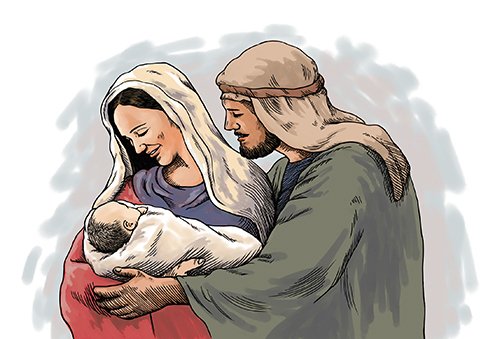

Synopsis: As Elizabeth so long ago said to Mary, “Blessed are you among women, and blessed is the fruit of your womb!” (Luke 1:42). May we honor, but not worship, this noble woman of faith.
The apostle Paul writes, “But when the fullness of the time had come, God sent forth His Son, born of a woman, born under the law, to redeem those who were under the law, that we might receive the adoption as sons” (Gal. 4:4-5, NKJV). Jesus our Savior, who came into the world as God in the flesh, was brought into this world through a woman; He had a human mother. Not just any woman would do when it came to God’s selection of the one who would give birth to the Christ. Out of all the women who have ever lived, only one was chosen to fulfill this great role.
We may not appreciate Mary, the mother of Jesus, as much as we should. Part of the reason why we may not appreciate her is that we do not take the time to read and study what the Bible says about her. It may be that we shy away from studying and discussing Mary out of a reaction to the errors of Roman Catholicism, which have attempted to turn Mary into something she never was and was never intended to be. Around AD 400, the practice of praying to Mary began to take hold, along with the doctrine that she was a perpetual virgin. Roman Catholic leaders elevated Mary to the status of one to be worshiped by the year 590. The doctrine of the Immaculate Conception of Mary, which alleges that she was miraculously conceived so that “original sin” would not be passed on to her, was adopted in 1854. And, in 1950 the doctrine of the Assumption of Mary (the idea that she was supernaturally transported into heaven) became an official doctrine. These teachings about Mary are accepted by millions of people throughout the world (Cairns). However, there is no Scriptural basis for any of the Catholic dogma concerning Mary.
Of one occasion during Jesus’ earthly ministry, the Bible says, “And it happened, as He spoke these things, that a certain woman from the crowd raised her voice and said to Him, ‘Blessed is the womb that bore You, and the breasts which nursed You!’ But He said, ‘More than that, blessed are those who hear the word of God and keep it!’” (Luke 11:27-28). Jesus could easily have instructed His followers to elevate His mother to some special spiritual status had that been His intention. He did not. However, while the Catholic Church is wrong about Mary, their error should not prevent God’s people from studying her life and discussing the truth of what the Bible does say about her. For far too long this great hero of faith has been stolen by Roman Catholicism. It is past time for Mary to be brought back to her rightful place among the faithful.
Many important mothers are mentioned in the Old and New Testaments, but only one of them gave birth to the Son of God. While she should not be treated in the manner the Roman Catholic Church treats her, Mary is a great example from whom we should learn. Consider the life of Mary, the mother of Jesus.
She was a virgin (Luke 1:26-34). A “virgin” is one who has never engaged in sexual relations, and the Bible calls Mary a “virgin” when the angel Gabriel appears to her (vv. 26-27). Responding to the angel’s news, Mary herself states that she has never had relations with a man to this point in her life (v. 34). Since her marriage to Joseph was not yet complete, she certainly should have been a virgin. Mary is a wonderful example in that she kept herself sexually pure while waiting for marriage. Tragically, there are fewer and fewer young people who, like Mary, remain virgins until they are married. The directive of Scripture is, “Flee sexual immorality” (1 Cor. 6:18), and that is what Mary did.
She was a willing servant of God (Luke 1:35-38). The angel tells Mary that her life, her marriage, her pregnancy, and her motherhood are going to be drastically different from all others since she has been chosen to be the woman responsible for bringing the Son of God into the world (v. 35). How does Mary react to this news? “Then Mary said, ‘Behold the maidservant of the Lord! Let it be to me according to your word.’ And the angel departed from her” (v. 38). In recognizing that the best thing she could do with her life was to serve God, Mary provides an outstanding example of the attitude that Christians today should have when it comes to serving the Lord. When we learn what is expected of us, do we react as she did? Or, do we offer a series of excuses for why we can’t come to worship, why we can’t study our Bibles, why we can’t tell others about Christ, and why we won’t stop sinning? Mary’s godly attitude and willingness to serve are seen in her beautiful expression of praise to God (vv. 46-55).
She was part of the fulfillment of prophecy (Matt. 1:18-25). An angel also spoke to Joseph, Mary’s husband, to explain to him that she would miraculously give birth to the Savior (vv. 18-21). However, Matthew’s gospel also informs us that Mary is the “virgin” who was spoken of by the prophet Isaiah centuries earlier: “So all this was done that it might be fulfilled which was spoken by the Lord through the prophet, saying: ‘Behold, the virgin shall be with child, and bear a Son, and they shall call His name Immanuel,’ which is translated, ‘God with us’” (vv. 22-23). No one would play a more direct role in the events surrounding the fulfillment of God’s plan of redemption than Mary, the mother of Jesus.
She was a mother of humble circumstances. In choosing a woman to be a mother for His Son, God didn’t select one who was wealthy and famous by the world’s standards, or who would be able to provide all the material things life might have to offer. Instead, He chose a Jewish peasant girl who was the wife of a carpenter (Matt. 13:55). In fact, when it came time for this divinely appointed mother to give birth to the Savior, the best she could do was to lay her newborn Son in a feed trough (Luke 2:7). As ordinary women of her day would tend to do, she went on to have several other children after Jesus was born (Mark 6:3). Her circumstances should remind us of what is really important in raising children when we see that one who possessed godliness was chosen to be the mother of Christ rather than one who possessed great wealth.
She was a mother who kept God’s law. Physical poverty, by itself, will not make one righteous. However, we see in Mary, along with her husband, Joseph, a certain diligence in obeying the law of God. The Law of Moses stated that male children were to be circumcised on the eighth day following their birth (Lev. 12:1-3), so that is what was done after Jesus was born (Luke 2:21). Following the birth of a child, the Law required the mother to present an offering to God (Lev. 12:6-8), and so that is what Mary did after Jesus was born, even though she could only afford the less expensive offering (Luke 2:22-24). The Mosaic code also stated that the Israelites were to observe the Passover Feast each year (Deut. 6:1, 5-6), and Joseph and Mary were in the habit of traveling to Jerusalem every year to do exactly that (Luke 2:41). Observing Mary’s attitude of respect for the word of God, understanding that she, out of all women, was chosen to be the mother of Jesus, helps us to appreciate better God’s concept of an ideal mother.
She was a mother who knew her Son was special. No doubt, there were times when Mary was amazed and confused by her firstborn Son and the things that others said about Him. Shortly after Jesus was born, the Bible says, “And Joseph and His mother marveled at those things which were spoken of Him” (Luke 2:33). When they searched frantically and found the twelve-year-old Jesus in the temple reasoning with the teachers of the law, He said to them, “‘Why did you seek Me? Did you not know that I must be about My Father’s business?’ But they did not understand the statement which He spoke to them” (vv. 49-50). However, the Bible also points out that Mary hadn’t forgotten what the angel Gabriel had told her about this Son, and she understood that He was not just an ordinary Son. Following the incident at the temple, Luke writes, “Then He went down with them and came to Nazareth, and was subject to them, but His mother kept all these things in her heart” (v. 51). Later, at the wedding in Cana, the Bible says, “And when they ran out of wine, the mother of Jesus said to Him, ‘They have no wine.’ Jesus said to her, ‘Woman, what does your concern have to do with Me? My hour has not yet come.’ His mother said to the servants, ‘Whatever He says to you, do it’” (John 2:4-5). Having given birth to the Son of God, Mary was placed in a unique position compared to every other mother who has ever lived or will live.
She was a mother who witnessed her Son’s death. Like many mothers, she knew what it was to be acquainted with terrible sorrow and tragedy. As Jesus was dying, the Bible says, “Now there stood by the cross of Jesus His mother, and His mother’s sister, Mary the wife of Clopas, and Mary Magdalene” (John 19:25). Furthermore, on this occasion a clear indication of the loving relationship shared between Jesus and His mother is provided as He instructs John to take care of Mary even as He is on the cross (vv. 26-27). The Bible doesn’t tell us what was going through Mary’s mind as she watched her special Son, the One who had been promised to her by God and who had been conceived and born while she was yet a virgin, die a cruel and torturous death on the cross. There were others standing by the cross that day who believed Jesus was the Son of God, but there was one person at the foot of the cross who knew with absolute certainty that He was. Even as she watched Him die, Mary knew that she had been a virgin when He was conceived and that His birth was the fulfillment of God’s promise to bring a Savior into the world.
The tragedy of Jesus’ death was lifted by the glory of His resurrection. On the first day of the week, which was the third day after He was crucified, Christ emerged from the tomb alive and began appearing to His followers (John 20:1-20). In response to those who came to the tomb on the first day of the week, the angel said, “Do not be alarmed. You seek Jesus of Nazareth, who was crucified. He is risen! He is not here. See the place where they laid Him” (Mark 16:6). Though Mary had watched her Son die, she would also see Him again after His resurrection.
Mary continued with the disciples of Jesus. When Jesus ascended into heaven following His resurrection, His disciples witnessed the event and then remained together in Jerusalem (Acts 1:9-11). Mary, the mother of Jesus, was with them. The Bible says, “Then they returned to Jerusalem from the mount called Olivet, which is near Jerusalem, a Sabbath day’s journey. And when they had entered, they went up into the upper room where they were staying: Peter, James, John, and Andrew; Philip and Thomas; Bartholomew and Matthew; James the son of Alphaeus and Simon the Zealot; and Judas the son of James. These all continued with one accord in prayer and supplication, with the women and Mary the mother of Jesus, and with His brothers” (vv. 12-14). What an amazing and wonderful thought to consider that the woman who was there to bring Him into the world was also there as He left the world to return to the Father in heaven. Mary was numbered among the disciples of Jesus as He took His place at the right hand of God.
As the mother of Jesus, Mary offers an excellent example of a godly mother and a godly person. There is only one person in history who will ever literally be the mother of Jesus, but the offer to have a relationship with Jesus is open to everyone in the world. “While He was still talking to the multitudes, behold, His mother and brothers stood outside, seeking to speak with Him. Then one said to Him, ‘Look, Your mother and Your brothers are standing outside, seeking to speak with You.’ But He answered and said to the one who told Him, ‘Who is My mother and who are My brothers?’ And He stretched out His hand toward His disciples and said, ‘Here are My mother and My brothers! For whoever does the will of My Father in heaven is My brother and sister and mother’” (Matt. 12:46-50). Will you take your place in the Lord’s family?
Cairns, Earle Edwin. Christianity Through the Centuries: A History of the Christian Church. Grand Rapids, MI: Zondervan, 1981.
Author Bio: David Dann has been working with the Hebron Lane church of Christ in Shepherdsville, KY since April 2016. He and his wife, Cynthia, have been blessed with six children. The church website is http://www.hebronlane.com/. He He may be reached at ddann1@hotmail.com.

